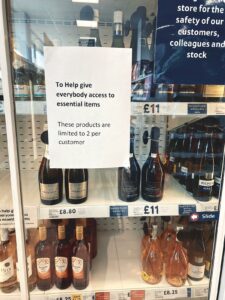Among the spate of articles offering well-being advice following the COVID-19 ‘Corona virus’ outbreak, many include calls for people to avoid self-medicating with drugs or alcohol. However, as images of supermarket alcohol shelves stripped bare circulate and multiple online alcohol retailers report long backlogs, it seems many people are seeking alcohol as a coping strategy for the uncertain times ahead.

Alcohol researchers meanwhile may be apprehensively waiting to see what follows one of the most unexpected natural experiments seen in the alcohol field. Off-licenses are a late government addition to the list of essential business allowed to stay open, raising some eyebrows over the implication that alcohol is an essential product. However, pragmatic reasons may include allowing pubs to continue to operate as off-trade businesses, potentially helping what is already a sector in decline, or theoretically ensuring a small proportion of severely dependent drinkers avoid unplanned withdrawal.
The shift to home alcohol consumption
The impact of alcohol only being available for home consumption is unlikely to yield many positives beyond certain retailer profits. Long-term rises in home consumption have been largely driven by increasing affordability and availability of alcohol, particularly via hyper-competitive ‘stack it high, sell it cheap’ supermarket strategies and the ‘democratisation’ of wine drinking. Despite the much-debated declines in youth drinking, the fall-out of decades of rising home drinking includes still increasing alcohol-related hospital admissions, now at over 1.3 million a year in England.
In turn, rises in domestic violence, fires and potentially alcohol dependence are logical predictions in the wake of the COVID-19 outbreak. Predicting the longer-term behavioural impact is however particularly difficult. Perhaps for some, home drinking may become more embedded, potentially exacerbated by the further closure of already struggling pubs and bars. For others, the period could highlight how valuable public and social drinking settings are, resulting in a boom in drinking out to celebrate the end of isolation.
The impact on social care and vulnerable groups
Meanwhile, concerns have been raised about the impact of the outbreak on vulnerable groups, including those with more severe alcohol problems. In the wake of austerity, huge public health cuts have left a treatment sector struggling to cope as the wider health and social care sector faces an unprecedented challenge. The economic impact will no doubt yield further challenges for a sector for which public and political support is hindered by the prevalent stigma still facing ‘problem’ drug or alcohol users. This is despite dependent groups contributing only a fraction of the total societal costs of alcohol.
The effect of the outbreak will also add some significant dynamics to Minimum Unit Pricing (MUP) evaluations that are based mainly on consumption data. Whilst positive early indications have emerged from Scotland, where sales were stemmed in 2018 despite a football world cup and a heatwave, the introduction in Wales this month will surely now coincide with a significant rise in sales. Whether or not any blunting effect of MUP will be observed in comparison with England again will remain to be seen, whilst calls have now been made to bring in MUP as an emergency public health measure.
Meanwhile, in Western Australia, official restrictions on alcohol have been brought in to stem panic buying and reduce the expected negative health impact. Back in the UK, it appears alcohol is being positioned – both legally and culturally – as an ‘essential good’ to help get the nation through. Once famed for our pubs, recognising the true extent of our home drinking habits may yet become more important than ever.
If you are concerned about your or someone else’s drinking, see here for further information.
See here for a list of useful COVID-19 links from the SSA.
An online discussion about alcohol and COVID-19 is being hosted by Phil Cain on Friday 27 March 2020.
Guidance for alcohol treatment services (PDF) from Scottish Health Action on Alcohol Problems

James Morris is part of the Centre for Addictive Behaviours Research at London South Bank University. He is also editor of Alcohol Policy UK and a behaviour change trainer.
The opinions expressed in this commentary reflect the views of the author(s) and do not necessarily represent the opinions or official positions of the Society for the Study of Addiction.
The SSA does not endorse nor guarantee the accuracy of the information in external sources or links, and accepts no responsibility or liability for any consequences arising from the use of such information.

